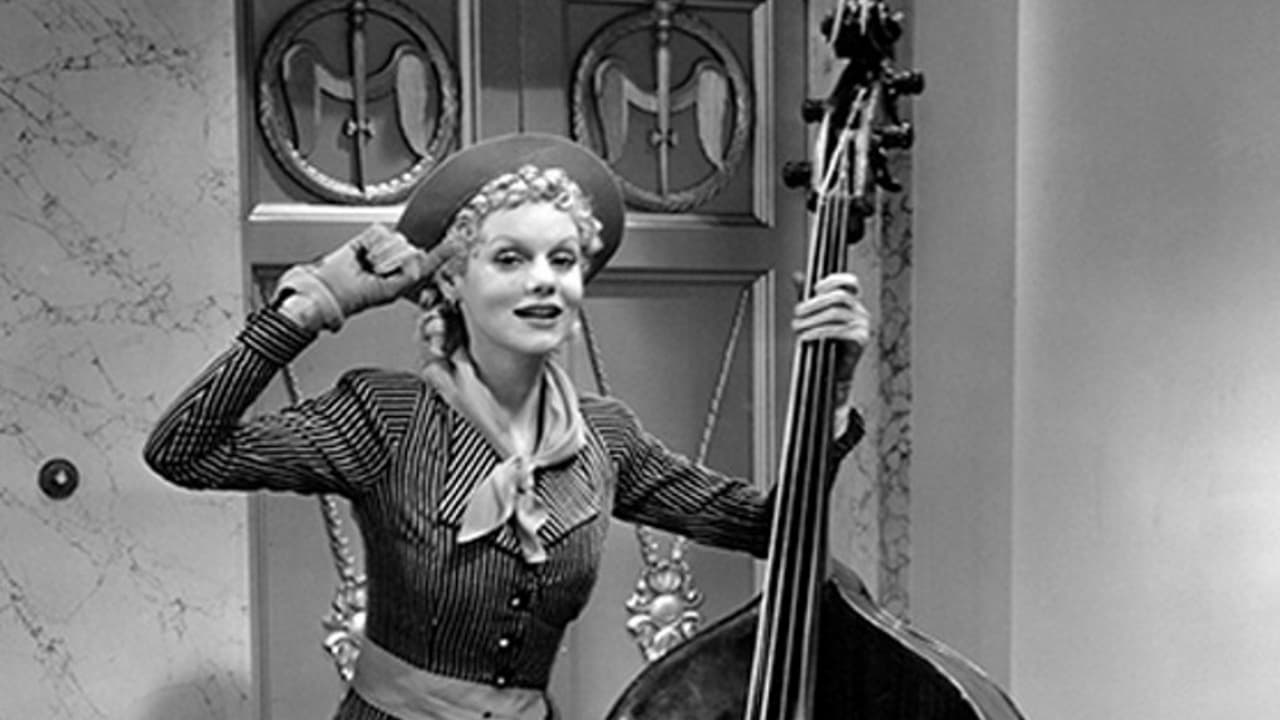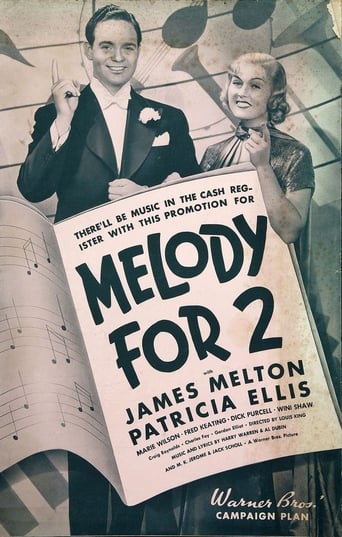

This, the third and last of of James Melton's three Warner Brotheres movies, gives some idea of why that studio did not renew the tenor's contract.There are other things wrong with this movie, certainly. The script is lame and seems downright telegraphed at times, perhaps explaining why the movie is only 60 minutes long. (The fact that there are cast members in cast lists who do not appear in the picture suggests that significant chunks of the script were either never filmed, or, less likely, filmed but not used.) But there are lots of popular 1930s musicals with weak scripts, so that is not the real culprit here.Some of the musical numbers are forgettable, certainly, but "A Flat in Manhattan" (sung by Patricia Ellis), "Dangerous Rhythm" and "An Excuse for Dancing" (both performed by Winifred Shaw, who sings wonderfully here), and especially "September in the Rain" (by Harry Warren and Al Dubin, sung very well by Melton) are pleasant enough. One of the problems with the movie is that, because it is so short, these better numbers don't get repeated in a way to sell them. Most just sort of come and go, especially "September in the Rain," even though it went on to be a hit anyway.The real problem, for me, is that none of the actors creates an interesting character. Melton in particular has a problem in this department. He seems angry throughout most of the picture, and that doesn't make for an endearing romantic lead. Nor does he get any good romantic scenes with either of the two female leads. The role is wrong for him, and does not present him in an appealing light. What was the point of making a lyric tenor take the part of a stubborn band leader?I don't know that the end of his movie career is a particular shame. After his three-picture stint in Hollywood, Melton went on for another 15 or so years on radio and records, quite successfully, and evidently eventually nightclubs, an understandably popular singer with a mellifluous John MacCormack-type lyric tenor. The fact that he did not make a success of it in Hollywood probably didn't deprive us of any important pictures, given the sorts of things other such tenors were put in in those days. (Think Allan Jones, for example.)There's really not much to recommend in this picture. If you hear the better songs, you've probably had the best of it.
... View MoreEven if you like musicals (and I do), don't bother with this bit of tripe. Suffice it to say, it's short, and that's about the only thing to recommend it. The acting is horrendous, the singing, highly mediocre, and the music itself is especially abysmal tripe, with nary a hummable tune in sight (just a lot of forgettable schlock). Add to this all the dull direction and production and this comes out as a total waste of time, albeit a short time. I gather the leading man went on to become an opera star. Well, he's certainly ugly, fat, and totally lacking in any acting talent, so I'm not surprised he did. 99% of all opera singers can't act and he is no exception. And Warren and Dubin must have been scraping the bottom of the barrel for the music delivered here. Though never the caliber of a Berlin, Gershwin, Arlen, etc., they did write a few memorable tunes, but you won't find any of them here.
... View MoreMELODY FOR TWO is a typical "B" movie musical of the late 1930's, running little over an hour featuring a talented but non-star cast. Don't expect 42ND STREET but do expect some good vocals, a number of funny lines, lots of entertainment, and some extremely good songs, notably "September in the Rain" which became far more famous than the film it debuted in and is surely as a great a movie song as any ever written.James Melton stars as a band-leader who tangles with arrogant songwriter Craig Reynolds, whom he fires right before his orchestra is about to begin a major contract with a New York nightclub. Reynolds takes his song collection with him, leaving Melton and band without any music for the show at the last minute. Band vocalist Patricia Ellis, something of a latent girlfriend to Melton, goes to Reynolds and persuades him to let the band use his song material for a high price under an non de plume , knowing Melton wouldn't take his songs for free. Reynolds agrees and the orchestra has a smash opening, only to have Reynolds blab to a gossip columnist about the secret which ridicules Melton. Angry, Melton quits the orchestra when the nightclub management refuses to drop the song repertoire which leads to him being blacklisted for walking out on a contract. Ellis reluctantly steps in as band-leader as well as vocalist and the band continues to be a major sensation. Feeling sympathy for Melton, she arranges for him to get a contract with a minor nightclub where despite the novelty angle of leading an all-girl orchestra business is poor until janitor Eddie Anderson (Rochester) persuades Melton to play music "hot" and provides him with some swing material. Then the tables are turned and Melton's band is the new sensation in town with his original orchestra with Ellis on the downturn. Eventually both bands must compete to obtain a radio contract and oily Reynolds is determined to pull underhanded tricks to see the results go his way.Opera star James Melton is fine shape vocally but not one of the better singers-turned-actors although he has a pleasant personality. Pretty Patricia Ellis, one of the most prolific "B" movie leading ladies of the 1930's, is pleasant in her role but the movie is stolen by delightful little Marie Wilson as the dingy amateur musician who turns out has some very good ideas. The movie is also notable for featuring the wonderful Warners contractee Winifred Shaw as the vocalist for Melton's second band. Miss Shaw is simply one of the best singers in 1930's films and it's always a treat to see her. One does wish she had been the one to wrap her extraordinary vocals around "September in the Rain" although Melton does a very good job with it. The song alone is worth tuning in to hear - but the talented cast and smooth production makes the whole picture quite pleasing.
... View MoreIn the barely one hour running time of Melody for Two a whole lot of musical numbers gets packed into it. So much so that unfortunately a lot of plot gets sacrificed. When I saw that Donald O'Connor was supposed to be in Melody for Two it confirmed my suspicions that a lot got left on the cutting room floor. Who knows if O'Connor had actually appeared in Melody for Two and had gone to Warner Brothers how much different a career path he might have had.James Melton and Patricia Ellis lead rival bands. In fact when the film starts out she's the female vocalist in his band. But when he gets into a stupid fight with his arranger and quits the club he's contracted for, she steps in and takes over the band.Not to be outdone Melton goes out and hires himself an all female orchestra. Both of them get into the latest of crazes, swing music and turn professional rivals.Right after this Melton left Warner Brothers and went on to grand opera and eventually became the lead tenor at the New York Metropolitan Opera in the Forties. But in this final Warner Brothers film, he introduced and popularized the song, September in the Rain.Harry Warren and Al Dubin had originally written this for Melton's first Warner Brothers film, Stars Over Broadway, but it was cut, though you can hear it in the background. In Melody for Two Melton got to sing it and it became a big hit in 1937, one of Warren and Dubin's biggest. Melody for Two is good easy to take entertainment. Look for Wini Shaw to also have a good number or two in it and Marie Wilson as the seemingly dumb bass fiddle player who comes up with the two ideas that change some personal history.
... View More